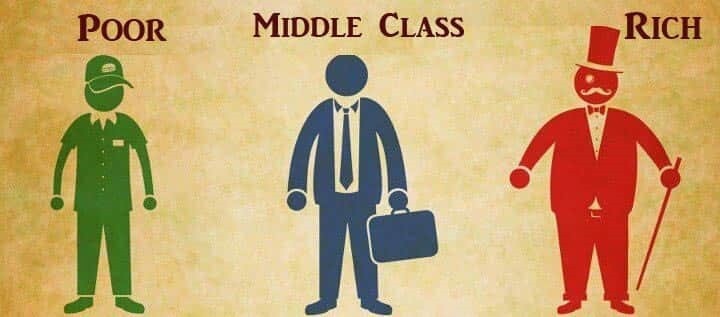Nigeria’s middle class and its political role is a frequent subject of debate and analysis, especially on online fora. The discussion is usually polarised, with opposing viewpoints on the damage or improvement brought about by the middle class to Nigeria’s economic and political stability.
To a large extent, this discussion is due to the concurrent rise of social media, changes in the economy, and the entry of some previously smaller social strata into mass politics.
The basic problem with any such discussion is around its definition and scope. These can be summarised through the following three questions: what constitutes the middle class in Nigeria? Do all, or at least most, members of this social and economic group share similar worldviews, especially on matters of politics and the economy? What ability does this middle class actually have to influence Nigeria’s politics and economy and how?
These are simple questions, but they require data of various forms that is not readily available in Nigeria. Do we categorise the middle class as ‘middle income’ i.e. people who fall somewhere in the middle of the income distribution? This seems less useful because an income number on its own does not suggest a distinctive relationship with society at large. A bank manager, a farmer with say 50 acres, and a garment trader can have the same income, but the means through which they make it, and the relations they have with others in their occupations, is drastically different.
What ability does the middle class actually have to influence Nigeria’s politics and economy and how?
An alternative is to take a sociological approach and categorise the middle class on the basis of individuals’ relations to the economy (Marx’s approach) or their economic and labour market standing (Weber’s alternative). These are more plausible since society is interlinked. We are defined by our relationship to others, through what we own (versus what others don’t), the nature of work that we do, the kind of skills that we have, and the type of lifestyle that we enjoy.
To date, the most comprehensive attempt to calculate a Nigerian middle class comes from former graduate course mate of mine at the Bayero University Kano, and presently a senior lecturer at the University of London 8 years ago, in his seminal paper titled Assessing the Middle Class in Developing Countries: A Case of Nigeria. Its main contribution is to suggest a definition that uses a composite of five weighted sub-indices of factors believed to be important for being part of the middle class. These five are education, occupation, income, lifestyle and housing. Using this ‘expanded middle-class’ concept, and drawing on data that was available in 2014, Nigeria is estimated to have a middle class that is around 33.7 per cent of the total population. A narrower approached used by the same author leads to a figure of 13.2 per cent of the total population.
This assessment is considerably dated through the approach remains a useful one. It should be replicated using new PSLM and Labour Force data to capture any changes that have taken place in the 8 years. Even though the economy has not grown by much, there is still some change taking place in educational attainment and lifestyles. For example, between 2014 and 2021, Nigerians above the age of 21 with an undergraduate degree (or above) grew from four to six per cent of the population. Within this age group, the proportion of women with an undergraduate degree has nearly doubled.
Let’s take a look at the second question – do members of the middle class have similar views on political and economic issues? As far as everyday discussions are concerned, it seems when we use the term ‘middle class’, we are mostly referring to educated citizens residing in urban areas, especially those working in salaried employment. This, as the figures above show, is a relatively small segment of the population. However, what little data that we have points to a similarity of political views within this segment. This is understandable as the life experiences of this segment are similar.
Overall, educational credentials are a reasonably strong predictor of support for the two major political parties in Nigeria, pretty much across the country. It is also why some of the PDP or APC earliest success in cosmopolitan cities of Lagos, Port Harcourt, Abuja, Kano and Kaduna among others were in constituencies with a higher proportion of upper-income, college educated voters. It would be good to get fresh data on key questions of politics, but it is not incorrect to suggest that many members of this particular type of middle class share similar worldviews.
Finally, what is the ability of this middle class to influence politics? A large segment of what is wrong in this country can be traced to the actions of the upper classes – business and landed elites who monopolise advantages through the political system. But if we take the judiciary, bureaucracy and military as middle-class institutions (after all, they consist of educated, salaried professionals), their impact is also immense, and arguably mostly detrimental. From upending the Constitution, to violating laws, to validating such violations, and failing to provide basic services, the leadership of these institutions has epitomised much that is wrong with the country. Sections of the legal community and professionals in journalism and academia have also contributed to the decline of their occupations and often sided with the status quo.
On the other hand, a random bank manager who expresses angry political views on social media is not making much of a difference either way. He or she may engage in the occasional unethical practices or try to cut corners through contacts, but that is a response to the incentives that the system offers. Ultimately, this dysfunctional system is held in place by those with the power to change it, but who choose not to do so. Keeping this fact in mind would bring considerable nuance to any discussion of the Nigeria middle class.





